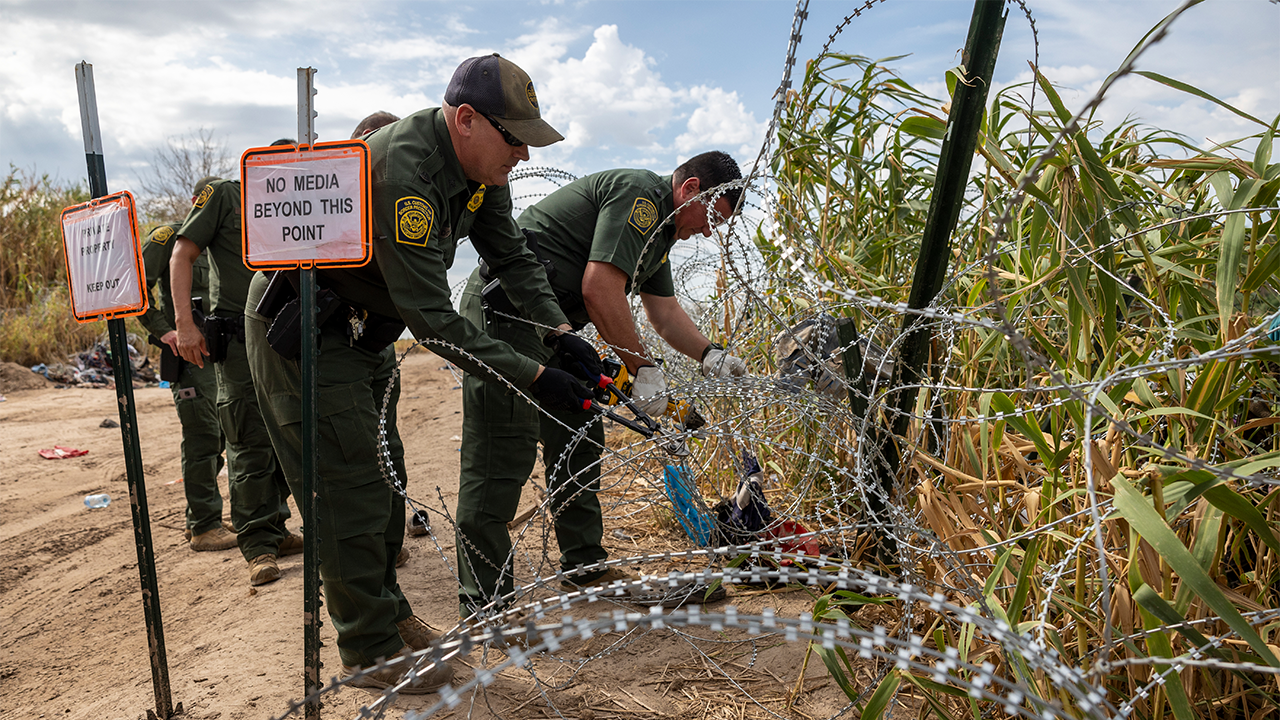Mississippi
It’s primary election day in Mississippi. Here’s what to watch for.

Voters across Mississippi will flood polling places today to select their favored candidates in numerous statewide and local primary elections.
Polls open at 7 a.m. and close at 7 p.m. When votes tallies are counted this evening, follow along with our live, interactive results at the link below.
READ MORE: Mississippi primary election results
And if you’re wondering about polling place info or maybe want to see a sample ballot before you head to the polls, check out our voter guide below for all the info you’ll need.
READ MORE: Mississippi Today 2023 Voter Guide
Here’s what we’re watching in Tuesday’s primary election:
1) The Republican primary for lieutenant governor
Many consider the lieutenant governor the single most powerful job in all of Mississippi politics. First-term incumbent Lt. Gov. Delbert Hosemann faces a tough challenger in state Sen. Chris McDaniel, an arch-conservative who is no stranger to statewide politics. The two Republicans have been attacking each other for weeks in mail pieces and in television advertising.
Lesser-known candidate Tiffany Longino is the third candidate in the race. If neither Hosemann nor McDaniel are favored by a majority of GOP voters, Longino could play spoiler and force a runoff between the top two candidates.
This is far and away the headliner of today’s primary elections. Will election night produce the same drama as the actual campaign itself?
READ MORE: AG Fitch says she’s investigating PAC run by Chris McDaniel treasurer
2) ‘Game on’ for Republican Gov. Tate Reeves and Democratic challenger Brandon Presley?
You’d be hard pressed to find anyone who believes incumbent Gov. Tate Reeves will have much of a problem today against two little-known Republican primary challengers John Witcher and David Hardigree. That would be welcomed news for Reeves, who was in a much worse situation this time four years ago.
In 2019, Reeves only captured 49% of the vote on primary day and was forced into a late August runoff with former Supreme Court Chief Justice Bill Waller Jr., who earned 33%. Former state Rep. Robert Foster garnered a respectable 18%.
Assuming Reeves wins today’s primary, what will the margin be? And what, if anything, could Democratic challenger Brandon Presley, who is unopposed in today’s primary, take from those results?
Today’s primary will likely make official what Mississippi and national prognosticators have long believed will be an expensive, nasty and close few weeks of gubernatorial campaigning.
READ MORE: Rowdy Neshoba County Fair attendees show that bitter race for governor is officially in full swing
3) Another record Republican turnout?
Four years ago, Mississippi Republican Party leaders celebrated the party’s highest ever turnout in a primary election.
Looking at the gubernatorial GOP primary vote totals from the past statewide cycles, the upward trend is obvious:
- 2019: 383,080 Republican votes cast
- 2015: 277,407 Republican votes cast
- 2011: 289,788 Republican votes cast
- 2007: 197,647 Republican votes cast
- 2003: 190,223 Republican votes cast
Looking at absentee ballots requested and returned for the 2023 primaries, one could surmise that Republicans will break the record again this year. Through this past weekend, Mississippi Today reporter Bobby Harrison reported, 45,199 absentee ballots were requested and 40,698 had been returned to the local circuit clerks. This is already up compared to the final numbers in the 2019 party primaries, when 42,096 ballots were requested and 38,237 were returned.
What does this trend mean, exactly? It’s hard to say. Perhaps Mississippi is, as GOP officials gleefully claimed four years ago, expanding its conservative voter base. They’re certainly continued expanding their slate of candidates up and down the ballot.
But maybe this trend is the effect of a virtually dormant Mississippi Democratic Party and a noticeable lack of high-profile Democratic candidates on statewide ballots. There’s new leadership at the Democratic Party headquarters, but it sure looks like they’ve got a mountain of work to do before they see any real shift in election results.
4) House and Senate race surprises
Republicans have for three terms now enjoyed supermajority control of the Legislature. Both the House and Senate are totally controlled by the Grand Old Party, meaning Republicans don’t need a single Democratic vote to pass any bill they want.
Don’t expect any partisan sea change or shift of legislative control in this year’s elections. However, recent history shows that we may be in for some big surprises tonight. Just four years ago, two of the top leaders of the House of Representatives unexpectedly lost their primary elections. House Pro Tempore Greg Snowden of Meridian and House Ways and Means Chairman Jeff Smith of Columbus lost to GOP primary challengers, shocking many political observers and drastically changing the upper realms of House leadership.
Will any current legislative leaders meet the same fate tonight?
5) Any big wins for the far right wing of the Republican Party?
For several years now, there’s been an obvious identity crisis within the Mississippi Republican Party. Three main factions of the GOP have emerged, and one of them — the far right wing of the party — has struggled for power and prominence even among their conservative peers.
Led by state Sen. Chris McDaniel and a handful of recruited uber conservatives running for statewide and legislative seats, this wing is hoping for some big wins tonight. As outgoing Republican state Rep. Dana Criswell put it to his supporters in an email on Monday: “The establishment folks have spent millions in the past few months in an attempt to end the conservative movement. This election is Mississippi’s fight for conservative government.”
If you’re keeping score at home, yes, Criswell is arguing that many Republicans on the ballot today are not true Republicans — RINOs (Republicans In Name Only), they’re often called.
Mississippi Today has a list of right wing candidates who are hoping to unseat Republicans in today’s primaries. We’ll have a full analysis of how they did later this week.
6) Down-ticket statewide races.
We have contested primaries for a few statewide offices and regional commissions outside of the governor’s and lieutenant governor’s races.
Three Democrats are running for their party’s nomination for Commissioner of Agriculture and Commerce. The winner of that primary will face incumbent Republican Commissioner Andy Gipson in the November general election.
Incumbent Republican Insurance Commissioner Mike Chaney faces a GOP primary challenger today in Mitch Young. The winner of that race will face Democrat Bruce Barton in the November general election.
And two of the three seats on the Mississippi Public Service Commission have primaries today. In the northern district PSC seat, currently held by Democratic gubernatorial candidate Brandon Presley, two Republicans are battling it out at the polls today: Tanner Newman and Chris Brown. The winner of this primary will be unopposed in November.
For the southern district PSC seat, incumbent Republican Commissioner Dane Maxwell has a primary challenger in Nelson Carr. The winner of that race will also run unopposed in November.
READ MORE: Carr claims Maxwell violated campaign finance laws
7) Don’t forget about the sheriffs and district attorneys.
If you live in a county where there are contested primaries for district attorney or county sheriff, you know exactly how much money gets pumped into these campaigns.
Several large counties have contested primaries for sheriff today, and there are six contested primaries for district attorney. These are very important elected positions of great power (further reading: Mississippi Today’s ongoing investigation with The New York Times of the long unchecked power of Mississippi sheriffs).
Another thing to ponder: These local races usually drive up turnout for the statewide races. If, say, Hosemann beats McDaniel tonight, you may hear him thank Harrison County and DeSoto County sheriff primary winners from the podium at his election watch party. Those farther up the ticket often do, in fact, ride the coattails of the local candidates running near the bottom of the ballot.

Mississippi
Thanksgiving on Mississippi Public Broadcasting Think Radio, set to air on Thursday, November 28th

MISSISSIPPI (KTVE/KARD) — For Thanksgiving, on Thursday, November 28, 2024, the Mississippi Public Broadcasting Radio will air a special programming.
Photo courtesy of Mississippi Public Broadcasting
According to officials, “Turkey Confidential” and “Feasting with the Great American Songbook: An Afterglow Thanksgiving Special” will run from 9 a.m. to 1 p.m. Francis Lam will be taking calls and help those in need of Thanksgiving cooking tips for the biggest cooking day of the year.
According to officals, “Feasting with the Great American Songbook: An Afterglow Thanksgiving Special” will explore classic jazz and popular songs about food by singers like Louis Armstrong, Louis Jordan, and Fats Waller, perfect for listening while sitting at the table.
Mississippi
Southeast Mississippi Christmas Parades 2024 | WKRG.com

MISSISSIPPI (WKRG) — It’s beginning to look a lot like Christmas on the Gulf Coast and that means Santa Claus will be heading to town for multiple parades around the area.
WKRG has compiled a list of Christmas parades coming to Southeast Mississippi.
Christmas on the Water — Biloxi
- Dec. 7
- 6 p.m.
- Begins at Biloxi Lighthouse and will go past the Golden Nugget
Lucedale Christmas Parade
Mississippi
‘A Magical Mississippi Christmas’ lights up the Mississippi Aquarium

GULFPORT, Miss. (WLOX) – The Mississippi Aquarium in Gulfport is spreading holiday cheer with a new event, ‘’A Magical Mississippi Christmas.’
The aquarium held a preview Tuesday night.
‘A Magical Mississippi Christmas’ includes a special dolphin presentation, diving elves, and photos with Santa.
The event also includes “A Penguin’s Christmas Wish,” which is a projection map show that follows a penguin through Christmas adventures across Mississippi.
“It’s a really fun event and it’s the first time we really opened up the aquarium at night for the general public, so it’s a chance to come in and see what it’s like in the evening because it’s really spectacular and really beautiful,” said Kurt Allen, Mississippi Aquarium President and CEO.
‘A Magical Mississippi Christmas’ runs from November 29 to December 31.
It will not be open on December 11th, December 24th, and December 25th.
Tickets can be purchased online or at the gate.
The event is made possible by the city of Gulfport and Coca-Cola Bottling Company.
See a spelling or grammar error in this story? Report it to our team HERE.
Copyright 2024 WLOX. All rights reserved.
-

 Science1 week ago
Science1 week agoTrump nominates Dr. Oz to head Medicare and Medicaid and help take on 'illness industrial complex'
-
/cdn.vox-cdn.com/uploads/chorus_asset/file/25739950/247386_Elon_Musk_Open_AI_CVirginia.jpg)
/cdn.vox-cdn.com/uploads/chorus_asset/file/25739950/247386_Elon_Musk_Open_AI_CVirginia.jpg) Technology1 week ago
Technology1 week agoInside Elon Musk’s messy breakup with OpenAI
-

 Health5 days ago
Health5 days agoHoliday gatherings can lead to stress eating: Try these 5 tips to control it
-

 Health3 days ago
Health3 days agoCheekyMD Offers Needle-Free GLP-1s | Woman's World
-

 Science2 days ago
Science2 days agoDespite warnings from bird flu experts, it's business as usual in California dairy country
-

 Technology1 day ago
Technology1 day agoLost access? Here’s how to reclaim your Facebook account
-

 Science1 week ago
Science1 week agoAlameda County child believed to be latest case of bird flu; source unknown
-

 Sports1 week ago
Sports1 week agoBehind Comcast's big TV deal: a bleak picture for once mighty cable industry















